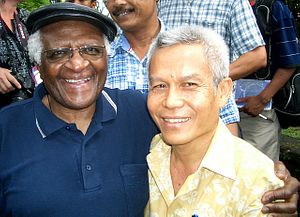Nothing will upset an Asian government more than comparisons with the heinous dictatorships and juntas of South America in the 1980s. Gun-toting soldiers sporting Ray-Ban aviators on deserted city streets, backed by tanks and a sinister security apparatus, is one common image.
The forced disappearance – a euphemism for state-sponsored kidnappings – of critics, political opposition or just plain irritants is another. Nor are those disappearances uncommon in Southeast Asia.
The disappearance of agriculturalist and reformer Sombath Somphone in Laos, labor protester Khem Sophath in Cambodia and lawyer Somchai Neelapaijit in Thailand are three of the more notable examples in a region mired in human rights abuses.
Now that practice seems to have been extended to nearby Hong Kong, where residents have for years believed that such dreadful things could never happen in the former British colony.
Five people who are linked to a Chinese book shop in the well-known Causeway Bay shopping precinct have gone missing amid speculation they have been taken by mainland authorities. One is a British citizen another is Swedish-Chinese.
Pro-democracy lawmaker Albert Ho recently said that he believed publisher Lee Bo had been taken against his will into the Chinese mainland because he planned a book about the love affairs of China’s President Xi Jinping and his exploits while working in the provinces.
“It’s a forced disappearance … all those who have disappeared are related to the Causeway Bay bookshop and this bookshop was famous, not only for the sale, but also for the publication and circulation of a series of sensitive books,” he said in a recent television interview.
The alleged kidnappings have also earned comparisons with North Korean tactics, although there the abductions took place outside the country. In Beijing, the government has said little, which is not unlike the response from authorities in countries south of the Chinese border.
The third anniversary marking the disappearance of Sombath Somphone was held in December, while the first anniversary of the disappearance of Khem Sophath – who was last seen with a gunshot wound to the chest – was held earlier this week.
Government friendly and state-controlled media ignored both anniversaries while journalists in both countries confided privately that local reporters were pressured by their editors not to run commemoration stories.
“We were ready to go out and do this story on Khem Sophath,” one Cambodian reporter told this journalist. “Then the editor walks in and yells wait, wait, no, no, we’re not doing that story.”
That came just two weeks after a Thai court upheld the acquittal of five police officers accused of abducting Somchai Neelapaijit, a prominent human rights lawyer who vanished in 2004 while he was defending suspected Islamic militants who had accused authorities of torturing them. Thailand is now controlled by the military.
Over the years, forced disappearances have, sadly, not been uncommon in Indonesia, Malaysia, Myanmar and the Philippines. Nor was mainland China an exception. If instigated by the government, then such practices do amount to one form of state-sponsored terrorism.
Hong Kong, however, was different. It had emerged as a vanguard for model behavior in a difficult part of the world during the 1990s and first decade of this century despite political dabbling by the communists in China and a fetish for pleasing Beijing among the ruling powers in the territory.
If allegations of kidnapping prove correct, then Beijing has failed in its obligation to ensure the security of its citizens and resentment among Hong Kongers will only build. And Xi will thoroughly deserve comparisons with the nastier leaders of Southeast Asia and those dictatorships of the 1980s in South America.
Luke Hunt can be followed on Twitter @lukeanthonyhunt
































